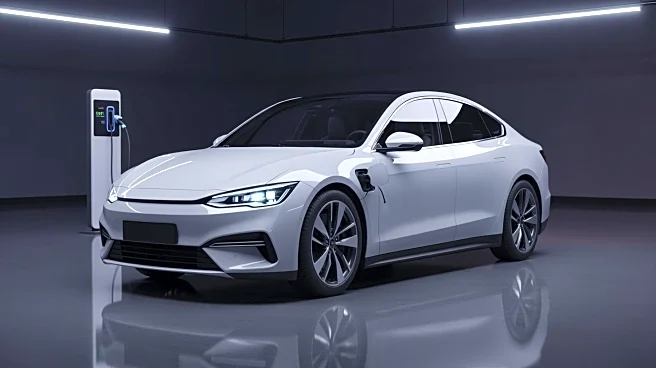What's Happening?
Electric vehicles (EVs) are experiencing a significant depreciation in value compared to gas-powered cars, affecting both private owners and fleet operators. The issue has been highlighted by the collapse
of BluSmart, an all-electric ride-hailing service in India, which saw its fleet's value plummet. In the U.S., Tesla's Model Y has depreciated by 42% over two years, while traditional vehicles like the Ford F-150 have only depreciated by 20%. The depreciation crisis is largely due to uncertainties surrounding the lifespan of EV batteries, which are a major component of the vehicle's value. Fleet operators, such as Hertz, have reported substantial losses due to the declining value of EVs, with Hertz experiencing a $2.9 billion loss in 2024. The resale value of EVs varies by region, with markets more open to electric vehicles, like China and Norway, supporting stronger resale prices.
Why It's Important?
The rapid depreciation of EVs poses a significant challenge to the sustainability movement, particularly for fleet operators who have committed to electrification. The financial viability of these operators is threatened as the resale value of their vehicles declines, impacting their ability to maintain profitable operations. This depreciation also affects consumer confidence in purchasing EVs, potentially slowing the transition to greener transportation options. The issue underscores the need for more reliable battery technology and better market understanding of EV value. As fleet operators and private owners face financial losses, the broader push for electric vehicle adoption may be hindered, affecting environmental goals and industry growth.
What's Next?
Fleet operators and industry stakeholders may need to explore alternative business models, such as battery-as-a-service, to mitigate the financial risks associated with EV depreciation. This model could provide predictable costs and stable values, offering a path forward for businesses reliant on electric vehicles. Additionally, advancements in battery technology and increased consumer confidence in used EVs could help stabilize resale values. The industry may also see a rise in certified pre-owned EV programs and state-of-health reports to aid informed decision-making. As the market adjusts, stakeholders will need to balance supply and demand to ensure the viability of electric vehicles in the long term.
Beyond the Headlines
The depreciation crisis highlights the need for a deeper understanding of EV value in the secondhand market, particularly as battery technology evolves. Ethical considerations around sustainability and environmental impact may drive further innovation in battery technology and vehicle design. The industry may also face legal challenges related to warranty claims and consumer protection as depreciation affects vehicle value. Long-term shifts in consumer behavior and market dynamics could reshape the automotive industry, influencing policy decisions and investment strategies.









